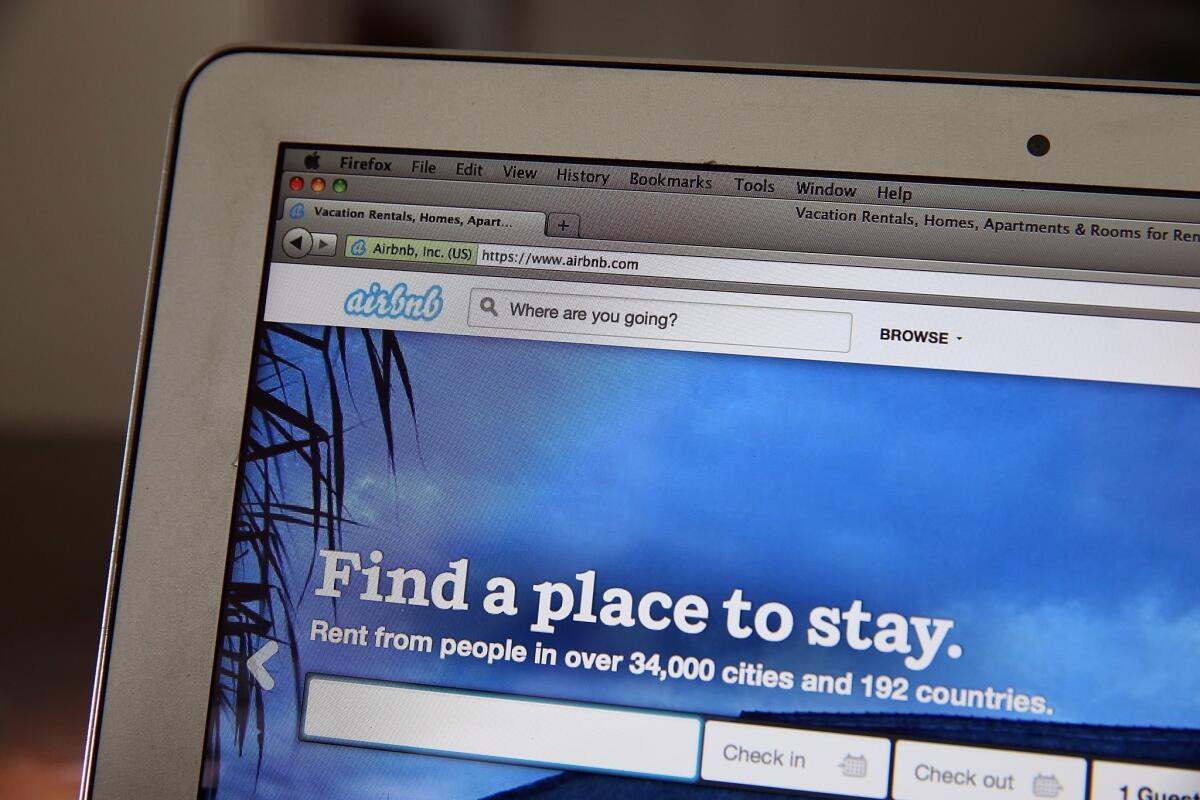Opinion: Beyond Uber and Airbnb: The future of the ‘sharing economy’

- Share via
I was watching from inside my shiny tower in London’s financial district the day that Lehman Bros. collapsed. Bankers were walking out the revolving doors clutching files and family photos, economic refugees in well-cut suits. The party was over. Of course, it had to end some time — we all knew that deep down. And though some people said that it was a free bar — get your order in before it ends! — we could have guessed a big bill was coming our way. More than five years later, we’re still living with the hangover.
Yet for many, these have been years of unprecedented opportunity. The boom time left us with too much of everything, from cars to second homes to power drills. Now that it’s over, we’ve never had a greater financial need to make use of these assets. An alternative economic and social model has risen from the wreckage of the credit crunch. Termed “collaborative consumption” by sharing innovator Rachel Botsman, this economy is based not on ownership but on the sharing of goods and services.
The hip, San Franciscan poster boy of this new “sharing economy” is the property rental site Airbnb. Instead of staying at the nearest Marriott, more than 11 million guests have booked strangers’ spare rooms and apartments since 2008. That’s just one example. Got a few spare hours? Run some errands on Taskrabbit. Some empty seats on your car journey? Sell them on BlaBlaCar.
As these companies have taken off, so too has the hype. But what does the future hold for them and the sharing economy as a whole?
To begin with, this is a sector that is just getting started. Its participants are typically marketplace businesses and benefit from network effects that can lead to sharply increasing growth rates. ParkatmyHouse.com, the London-based startup for which I am CEO, is one such marketplace gaining thousands of new users a week. Whenever a new user lists or books a parking space, the service becomes more useful, setting the conditions for ever more rapid growth.
Network effects make it likely a clear winner will emerge in each vertical, hoovering up the mass market of consumers. This process is being catalyzed by the rush of venture capital into the sharing economy and consolidation, such as car-sharing company Relay Rides’ acquisition of Wheelz. As these businesses grow, some will piggyback on the very largest ones. In August 2013, Waze, a navigation app that crowd-sources traffic information, was acquired by Google for $1.3 billion.
Indeed, transportation is set to become the sharing economy’s next vertical to blow up. Uber, SideCar and Lyft let people enroll as taxi drivers, undercutting and outperforming taxi companies. After that? Education. With student debt in the U.S. at more than $1 trillion, startups like Skillshare provide access to top-class tutors for less than the price of a Harvard hoodie. Online lending might be the biggest of all. Zopa and Prosper are hoping to make even more bankers redundant.
Meanwhile, these companies are collecting data from user behavior and third-party sites. In addition to helping their marketplaces become more transparent, this data will become useful for other companies. Consider a world in which a lender or employer could assess your risk profile or professionalism by analyzing your activity within an online community. Trust is valuable; it loosens purse strings. Unsurprisingly, there are startups like Trust Cloud and Connect.me working on measuring and monetizing these pools of trustworthiness.
Significant challenges remain. Sharing economy businesses often operate within challenging regulatory environments and can expect fierce counter-lobbying from those whose market share is threatened. However, the biggest obstacle they face is the 20th century expectation of a consistent consumer experience. Some collaborative consumption companies are able to turn the variability of their products into a strength. For example, every luxury property on OneFineStay is unique.
Raising standards will also help collaborative consumption companies navigate this obstacle. Behind most of these businesses are individual sellers or renters with their own personal brands, marketing and reviews. Competition with professional sellers that can provide a more consistent product and more efficient customer service will drive up standards. As Airbnb has shown, professional yield-hungry sellers will enter lucrative marketplaces, operating a “buy to share” model.
But overwhelmingly, collaborative consumption businesses are utilizing existing capacity. That’s good news for everyone. If we buy fewer houses and cars — our largest, most highly financed investments — it will help in the deleveraging of the global economy. Fewer mortgages mean less debt for bankers to collateralize; and, according to Zipcar, every shared car takes several others off the road.
So the next time the music stops and the global economy implodes, we might wake up with a little less of a hangover.
Alex Stephany is CEO of ParkatmyHouse.com. Follow him on Twitter @alexmstephany.
More to Read
A cure for the common opinion
Get thought-provoking perspectives with our weekly newsletter.
You may occasionally receive promotional content from the Los Angeles Times.









